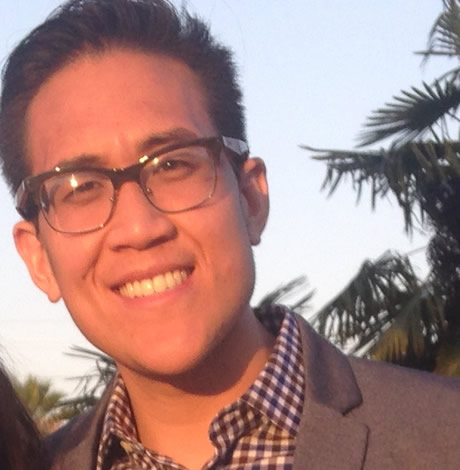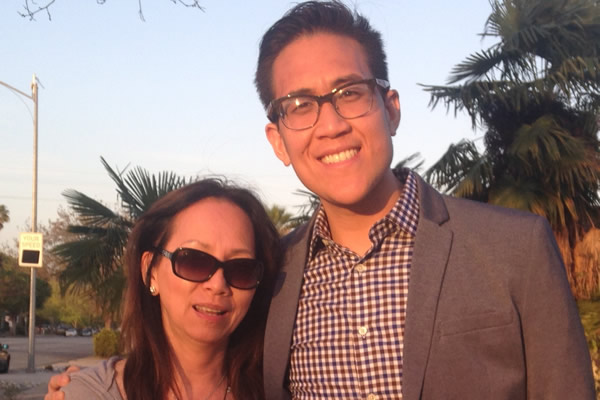Local
Gay man to head D.C. Office of API Affairs
Appointment of David Do makes four out cabinet members


D.C. Mayor Muriel Bowser appointed gay urban planning specialist David Do, on right, as director of the city’s Office of Asian and Pacific Islander Affairs. (Photo courtesy of David Do)
D.C. Mayor Muriel Bowser on Sunday night announced she has appointed gay urban planning specialist and former D.C. government official David Do as director of the city’s Office of Asian and Pacific Islander Affairs.
Bowser made the announcement while speaking at the 26th Annual Korean-American Grocers Association of Washington, D.C. Scholarship Award Banquet. The event was held at the Ukrainian Catholic National Shrine of the Holy Family located near Catholic University in the city’s Brookland section.
“David is a passionate leader who is committed to improving the quality of life for the residents of the District of Columbia,” Bowser said in making the announcement.
“I welcome David’s enthusiasm and am delighted to have him join our team. David will be instrumental in working with the AAPI community on behalf of my administration to deliver a fresh start for the District’s residents,” she said.
Do’s appointment to the cabinet-level post requires confirmation by the City Council. Political observers familiar with the Council expect the Council to approve the appointment.
Do is a Vietnamese American and the child of a family that came to the U.S. as Vietnam War refugees. He finished a close second in a five-candidate race for a seat on the D.C. State Board of Education from Ward 1 in last November’s city election. In December he received a master’s degree in community planning from the University of Maryland.
Prior to enrolling in graduate school at Maryland, where he also served as a teaching assistant, Do served as a correspondence management specialist in the mayor’s Correspondence Unit under Mayors Adrian Fenty and Vincent Gray.
A statement released by Bowser’s office on Sunday says among Do’s goals in his new job will be to “move forward together by continuing to build bridges between the District’s AAPI community and all Washingtonians.”
The statement adds, “Do will lead OAPIA in its mission to improve the quality of life for District AAPIs through advocacy and engagement. Do will advise the mayor, the Council, and District agencies on the views, needs, and concerns of the AAPI community, provide recommendations on District programs and initiatives affecting the AAPI community, and help to coordinate programs and initiatives within District government that promote the overall welfare of the AAPI community.”
Do becomes the fourth openly gay or lesbian appointed by Bowser to a cabinet-level position. Last week Bowser named lesbian activist, media professional and former Washington Blade vice president for strategic initiatives Sheila Alexander-Reid as director of the Mayor’s Office of LGBT Affairs.
Shortly before taking office as mayor on Jan. 2, Bowser named lesbian housing and homelessness policy expert Polly Donaldson as director of the D.C. Department of Housing and Community Development and gay former city official Matt Brown as director of the Mayor’s Office of the Budget.
“I am excited to be appointed by Mayor Bowser to lead the Office of Asian and Pacific Islander Affairs,” Do said in a statement. “I will bring my experience and deep understanding of various community groups and stakeholders in Washington, D.C. to my new role,” he said. “My focus will be on making sure that the Asian-American and Pacific Islander has a strong advocate and voice within the District.”
Maryland
Md. Commission on LGBTQIA+ Affairs released updated student recommendations
LGBTQ students report higher rates of bullying, suicide

The Maryland Commission on LGBTQIA+ Affairs has released updated recommendations on how the state’s schools can support LGBTQ students.
The updated 16-page document outlines eight “actionable recommendations” for Maryland schools, supplemented with data and links to additional resources. The recommendations are:
- Developing and passing a uniform statewide and comprehensive policy aimed at protecting “transgender, nonbinary, and gender expansive students” against discrimination. The recommendation lists minimum requirements for the policy to address: name, pronoun usage, and restroom access.
- Requiring all educators to receive training about the specific needs of LGBTQ students, by trained facilitators. The training’s “core competencies” include instruction on terminology, data, and support for students.
- Implementing LGBTQ-inclusive curricula and preventing book bans. The report highlights a “comprehensive sexual education curriculum” as specifically important in the overall education curriculum. It also states the curriculum will “provide all students with life-saving information about how to protect themselves and others in sexual and romantic situations.”
- Establishing Gender Sexuality Alliances “at all schools and in all grade levels.” This recommendation includes measures on how to adequately establish effective GSAs, such as campaign advertising, and official state resources that outline how to establish and maintain a GSA.
- Providing resources to students’ family members and supporters. This recommendation proposes partnering with local education agencies to provide “culturally responsive, LGBTQIA+ affirming family engagement initiatives.”
- Collecting statewide data on LGBTQ youth. The data on Maryland’s LGBTQ youth population is sparse and non-exhaustive, and this recommendation seeks to collect information to inform policy and programming across the state for LGBTQ youth.
- Hiring a full-time team at the Maryland Department of Education that focuses on LGBTQ student achievement. These employees would have specific duties that include “advising on local and state, and federal policy” as well as developing the LGBTQ curriculum, and organizing the data and family resources.
- Promoting and ensuring awareness of the 2024 guidelines to support LGBTQ students.
The commission has 21 members, with elections every year, and open volunteer positions. It was created in 2021 and amended in 2023 to add more members.
The Governor’s Office of Communication says the commission’s goal is “to serve LGBTQIA+ Marylanders by galvanizing community voices, researching and addressing challenges, and advocating for policies to advance equity and inclusion.”
The commission is tasked with coming up with yearly recommendations. This year’s aim “to ensure that every child can learn in a safe, inclusive, and supportive environment.”
The Human Rights Campaign’s most recent report on LGBTQ youth revealed that 46.1 percent of LGBTQ youth felt unsafe in some school settings. Those numbers are higher for transgender students, with 54.9 percent of them saying they feel unsafe in school.
Maryland’s High School Youth Risk Behavior Survey reveals a disparity in mental health issues and concerns among students who identify as LGBTQ, compared to those who are heterosexual. LGBTQ students report higher rates of bullying, feelings of hopelessness, and suicidal thoughts. Nearly 36 percent of LGBTQ students report they have a suicide plan, and 26.7 percent of respondents say they have attempted to die by suicide.
The commission’s recommendations seek to combat the mental health crisis among the state’s LGBTQ students. They are also a call for local and state governments to work towards implementing them.
Virginia
Va. lawmakers consider partial restoration of Ryan White funds
State Department of Health in 2025 cut $20 million from Part B program

The Virginia General Assembly is considering the partial restoration of HIV funding that the state’s Department of Health cut last year.
The Department of Health in 2025 cut $20 million — or 67 percent of total funding — from the Ryan White Part B program.
The funding cuts started with the Trump-Vance administration passing budget cuts to federal HIV screening and protection programs. Rebate issues between the Virginia Department of Health and the company that provides HIV medications began.
Advocates say the funding cuts have disproportionately impacted lower-income people.
The Ryan White HIV/AIDS Program, a federal program started in 1990, provides medical services, public education, and essential services. Part B offers 21 services, seven of which remained funded after the budget cuts.
Equality Virginia notes “in 2025, a 67 percent reduction severely destabilized HIV services across the commonwealth.”
Virginia lawmakers have approved two bills — House Bill 30 and Senate Bill 30 — that would partially restore the funding. The Ryan White cuts remain a concern among community members.
Both chambers of the General Assembly must review their proposed changes before lawmakers can adopt the bills.
“While these amendments aren’t a full restoration of what community-based organizations lost, this marks a critical step toward stabilizing care for thousands of Virginians living with HIV,” said Equality Virginia Executive Director Narissa Rahaman. “Equality Virginia plans to continue their contact with lawmakers and delegates through the conference and up until the passing of the budget.”
“We appreciate lawmakers from both sides of the aisle who recognized the urgency of this moment and will work to ensure funding remains in the final version signed by the governor,” added Rahaman.
District of Columbia
D.C. Black Pride theme, performers announced at ‘Speakeasy’
Durand Bernarr to headline 2026 programming

The Center for Black Equity held its 2026 DC Black Pride Theme Reveal event at Union Stage on Monday. The evening, a “Speakeasy Happy Hour,” was hosted by Anthony Oakes and featured performances by Lolita Leopard and Keith Angelo. The Center for Black Equity organizes DC Black Pride.
Kenya Hutton, Center for Black Equity president and CEO, spoke following the performances by Leopard and Angelo. Hutton announced this year’s theme for DC Black Pride: “New Black Renaissance.”
Performers for 2026 DC Black Pride were announced to be Bang Garcon, Be Steadwell, Jay Columbus, Bennu Byrd, Rue Pratt and Akeem Woods.
Singer-songwriter Durand Bernarr was announced as the headliner for the 2026 festivities. Bernerr gave brief remarks through a video played on the screen at the stage.
DC Black Pride is scheduled for May 22-25. For more information on DC Black Pride, visit dcblackpride.org.


















